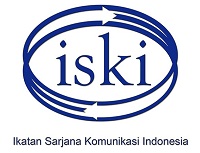Abstract
His paper concerns with communication and praxis of freedom. Communication in wider perspective is not just transftring a message but more than that. It is not just a process but involves many aspects of human lift such as culture and language. Culture and language reflect an understanding of reality. We can only perceive reality through language,whilelanguage can not be separated from culture. Language, basicly, is symbolization of reality using meaningful sign. That symbolization reducts reality into single aspect perceived by signs, however they want to represent it in one-ta-one correspondence. So the reality we perceive through language is not the real reality. It means that the communication we do is a complex action. The process of establishing meaning has something to do with people, because sign (language) . by itself has no meaning. Words do not mean but people mean. In relating with power, the meaning ofsign (languange) is determined by who holds the power. Whoever they are, they will have a dominant interpretation of meaning. Communication (as far as relate to culture, language, reality, and sign)is no longer free because it is not reflecting reality anymore, but symbolizing the power. Communication. naturally, is reflecting reality, that what we call free communication. But the(political)power has canged communication being just a tool for their interest. Communication reflects reducted reality. That is a chained communication. Communication has to be placed again in its natural place (reflecting reality) sowe can interpretate reality freely.
Keywords
Komunikasi, Praksis Kebebasan
References
ldi Subandy Ibrahim dan Yudi Latif (ed), Bahasa dan Kekuasaan, Bandung, Mizan, 1996;
Prisma No. 1 tahunXVIII, 1989, dan Prisma English Edition No. 50 September 1990.
Marshal McLuhan, Understanding Media: The Extensions of Man (London: Sphere Books Imt., 1967
Yasraf Amir Piliang Sebuah Dunia Yang Dilipat: Realitas Kebudayaan Menjelang Milenium Ketiga dan Matinya Posmodernisme, Bandung, Mizan: 1998
Fransisco Budi Hardiman, Menuju Masyarakat Komunikatif Ilmu. Masyarakat & Politik Postmodernisme Menurut Jurgen Habermas, Yogyakarta, Kanisius: 1993.
























